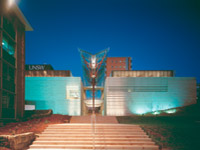|
||||||||||||||||||||||||||||||||||||||||||||
| Arts (Media & Comms) / Law - 4764 | ||||||||||||||||||||||||||||||||||||||||||||

This Program is no longer accepting new enrolments
This program is not available to commencing students. Details below are provided for the reference of continuing students only.
Prospective students should refer instead to the new Media/Law programs. This program combines the professional Bachelor of Laws with the Bachelor or Arts (Media and Communications). The Bachelor of Arts (Media and Communications) emphasises new computer-based multimedia skills and focuses on Australian media industries in relation to globalisation. The degree is vocationally relavant in its orientation and all students are given significant practical experience in new computer-based multimedia communications technologies. It aims to develop in students a sophisticated understanding of the history, scope and socio-cultural impact of new media technologies, and of the debates that have accompanied their development and use. Second, it offers extensive experience in the production of new media content appropriate for employment in the contemporary media. Note: This degree combination would be of interest to students interested in becoming media lawyers, or in the fields of broadcast media (video based, multi media production and post production; research, administration and policy analysis for private corporations, telecommunications companies and government departments.
Program Objectives and Learning Outcomes In addition to studying 8 courses in the Media and Communications core program, students complete 6 courses from List A of the Faculty of Arts and Social Sciences, to permit them to study a second field in depth. Years 1 and 2 cover multimedia writing and production and contextual media studies. Year 3 consolidates the program's emphasis on production and analytical skills. This grounding enables students to interpret, create and apply the products of the new media not only in the context of the mass information and entertainment industries, but also in a variety of other public and private sector areas such as education, on-the-job training and specialised information services.
Total Unit Requirements
An approved sequence of study can be found here:
Plan for Arts (Media & Comms)/ Law 4764 For details of the available Media & Communications courses, please refer to the Bachelor of Arts program, 3400. A direct link is given below: Bachelor of Arts 3400 General Education Requirements Students enrolled in a combined law degree are not required to complete general education courses.
Honours in the BA Program
Students wishing to take the BA(Media and Communications) degree program at Honours level must obtain prior approval from the relevant Schools in the Faculty of Arts and Social Sciences and the Faculty of Law. At least one and possibly two additional years of study are required. Alternatively students may consider completing the BA degree program at Honours level (4 years) and then seeking admission to the three year LLB degree program for graduates. Rules for the award of Honours in the Bachelor of Laws
Award of Honours
The Bachelor of Laws (LLB) may be awarded with the following levels of Honours:
Honours Class 1 Honours Class 2, Division 1 Honours Class 2, Division 2 The award of Honours in the LLB program is based on two requirements: 1) the Weighted Average Mark (WAM); and 2) satisfactory performance in written research. 1) Weighted average mark In general terms, students who score a WAM in the top 10% of the graduating cohort in each semester will be eligible for the award of Honours Class 1; students with a WAM in the next 10% will be eligible for the award of Honours Class 2, Division 1; and students with a WAM in the next 10% will be eligible for the award of Honours Class 2, Division 2. All courses taken towards the Law degree will be taken into account for written research requirements, but only those taken at UNSW Law School will count towards the WAM. 2) Satisfactory performance in written research To demonstrate “satisfactory performance in written research” a student must complete one long substantial piece or three shorter substantial pieces of research writing in their program. In particular, a student must attain at least a credit grade either in LAWS 2423 Research Thesis (8 uoc); or (16 uoc); or in each of three (3) research papers of at least 3000 words each, taken in any three (3) courses in the LLB program. At the time of enrolment in courses in their final semester, students who have demonstrated satisfactory performance in written research must submit an approved Honours Nomination Form to the Honours Committee detailing the basis upon which the research requirement has been met, and the course or courses in which the requisite grades were attained. If a student has not met the Honours research requirement before the end of their penultimate semester, he or she must notify the Honours committee of the LLB courses in which they propose to meet the requirement before the census date in their last semester. Failures and Academic Misconduct In no circumstances will a student be eligible for the award of Honours if he or she has (a) failed more than one course in the LLB program; (b) been found guilty of plagiarism or serious misconduct on more than one occasion. See program 4790 for academic rules relating to the Bachelor of Laws Program. A direct link is given below;
Bachelor of Laws 4790 For information regarding fees for UNSW programs, please refer to the following website: https://my.unsw.edu.au/student/fees/FeesMainPage.html
|
||||||||||||||||||||||||||||||||||||||||||||


